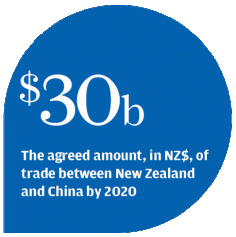
New Zealand-China currency deal to boost bilateral investments
Direct conversion between the kiwi and the yuan will further encourage bilateral investments beyond dairy products to health care and aviation
The recent deal with China to allow direct trading between the yuan and the New Zealand dollar will encourage two-way investments, in particular in fast-growing sectors such as health care, education and aviation, according to New Zealand's Finance Minister Bill English.

He made the comments during a trip in Hong Kong to meet investors, Hong Kong Monetary Authority officials and private equity firms about potential investment opportunities in New Zealand.
Last week, China and New Zealand signed a deal to allow direct conversion between the kiwi and the yuan. The deal was aimed at reducing costs for exporters and importers by removing the necessity for transactions to be settled in US dollars, the usual practice.
The two countries last week agreed to grow bilateral trade to NZ$30 billion (HK$198.7 billion) by 2020.
"The agreement is a natural evolvement in political and trade relationship. Bilateral trade has been growing rapidly because of the free-trade agreement negotiated in 2006 and there is a need to add to the momentum of that growth," said English.
He said the country was looking for new engines to further boost trade, on top of dairy products, which accounted for nearly half the exports to China by value last year.
New Zealand is in talks with local Chinese governments to form health-care service partnerships between hospitals or medical firms on the two sides, seeking to become a significant health-care service exporter to a rapidly ageing China.
English also said growing domestic flight traffic in China would boost demand for pilot training and aircraft management services, where New Zealand could help.
"There is going to be strong demand for public services … New Zealand companies have a lot of experience in these sectors and are relatively low-cost providers of health care and education. We see opportunities for significant space from a very low base in the coming years," he said.

